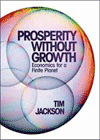Structural Time Series Model of UK Household Expenditure and the Contribution of Economic Versus Non-economic Factors
Overall aims
In order to help move towards more sustainable consumption and lower emissions in the future, this project attempted to model disaggregated UK household expenditure and to quantify the contributions of economic and non-economic factors that drive UK consumer expenditure.
Context
UK household expenditure has increased considerably over the past 50 years – so fast in fact that some would claim that it is not ‘sustainable’, strongly arguing there is a need for a significant change in policy with government intervening to curtail future consumption. Policy makers therefore need to understand better the structure of UK household expenditure to be able to influence expenditure patterns and move towards more ‘sustainable consumption’. To do this there is arguably a need to quantify not only the key economic drivers of income and price, but also the non-economic factors such as technical progress, consumer taste and preferences, socio-demographic and geographic factors, lifestyle and value changes. The aim here is therefore to quantify the relative contribution of economic and non-economic factors in determining UK household expenditure.
Research methods
Which of the economic or non-economic factors have higher contributions in driving expenditure for each category?
What are the income and price elasticities of expenditure for each category?
The RESOLVE model of Econometric, Lifestyle, Environment, Scenario Analysis (ELESA) was developed to answer these questions. In ELESA, UK household expenditure functions were estimated for 16 COICOP (Classification of Individual Consumption by Purpose) categories using the Structural Time Series Model over the period 1964:q1 - 2009:q1. This approach allows for the relative quantification of the impact of non-economic factors on UK household expenditure (via a stochastic trend and stochastic seasonal) in addition to the economic factors (income and price) and temperature. From this, income and price elasticities of expenditure were estimated and the relative contribution of income, price, non-economic factors and temperatureResults
The overall results show that the contribution from the exogenous non-economic factors (ExNEF) to annual changes in expenditure was important and for a number of categories very high in all periods since 1980 relative to the contribution from the economic drivers of price and income; for example ‘gas’, ‘other housing’, ‘health’, ‘vehicle fuels and lubricants’, communication’, ‘recreation and culture’ and ‘miscellaneous goods and services’. The income contribution to changes in household expenditure was also relatively important for all periods since 1980: in particular the ‘restaurants and hotels’ and ‘furnishings’ categories. For other categories a mixture of contributions from the different factors were important in driving expenditure changes. Interestingly, there was no category where ExNEF made no contribution in driving changes in expenditure; hence this should arguably not be ignored by policy makers when considering policies to reduce expenditure and consumption.
Implications
Policy makers might consider non-economic policies and interventions that attempt to influence household lifestyles, behaviours and environmental awareness in order to achieve more sustainable consumption in the future. Of course, beside such policies, economic incentives of price increase through (carbon) taxes should carefully be considered; keeping in mind the negative side effects of such policy i.e. price increase in other associated sectors, reduction in consumer welfare and poverty.
Outputs
Chitnis, M and L C Hunt 2009. Modelling UK household expenditure: economic versus non-economic drivers. RESOLVE Working Paper Series 07-09. Guildford: University of Surrey.
Chitnis, M and L C Hunt 2010.Contribution of economic versus non-economic drivers of UK household expenditure. RESOLVE Working Paper Series 03-10. Guildford: University of Surrey.
Chitnis, M and L C Hunt, 2011. Modelling UK household expenditure: economic versus non-economic drivers. Applied Economics Letters, 18 (8), 753-767.





